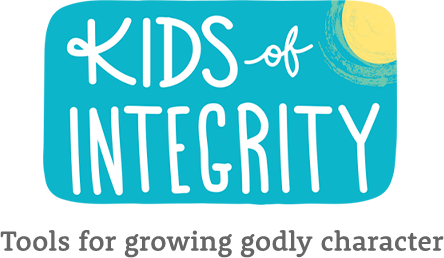Harmony
Discover the meaning behind the Hebrew greeting, "Shalom." Discussion point: Introduces important concepts about how God works to restore peace, beginning with the Fall.
Introduce your children to the Hebrew word Shalom. Shalom is traditionally used as a greeting. Shalom Aleichem means “Peace be with you.” Although many people use the term casually, as we would say “hello” or “good-bye,” the word Shalom has a much deeper meaning.
Explain that Shalom is a sense of wholeness and well-being that exists when we are at peace with God and others because we have allowed God to forgive our sins and replace our sinful human nature with His new nature (Romans 8:5-8). Everyday circumstances occur that require us to ask God to send His Holy Spirit to bring Shalom into our lives. Philippians 4:6-7 says, “Do not be anxious about anything, but in everything, by prayer and petition, with thanksgiving, present your requests to God. And the peace of God, which transcends all understanding, will guard your hearts and your minds in Christ Jesus.” It is wanting things “my way” or our sinful nature that tempts us to want to repay evil for evil, to be first and to have the biggest and the best for ourselves. But Jesus tells us that the first will be last. He teaches us His way: to share what we have, to give generously and to forgive others readily. Following our sin nature fosters discord, but Jesus’ way promises peace.
Through familiarizing your children with the significance of this word, you can expand their vocabulary and their understanding of God’s role in bringing peace into our lives. For younger children, you may want to complete these activities over the course of a few days. If you prefer, these activities can be done using the word peace instead of Shalom.
- Begin by asking your children to imagine that they are in the Garden of Eden. Pretend to be walking around together, looking at all of the wonderful plants and animals God created. Point at butterflies flying by, pet an otter and perhaps go for a ride on a tiger. Highlight what a privilege it would be to walk and talk with God as Adam and Eve did. Emphasize the reverence and awe you would experience being in the presence of God. Tell your children that because Adam and Eve had not yet sinned, they were able to be in God’s presence and experience complete shalom.
- Ask your children if they know how Adam and Eve ruined the peace that existed between themselves and God. Liken this to a child sneaking a cookie. A child who has taken a cookie without asking permission does not want to be seen by a parent.
- Pretend to be Adam and Eve hiding from God. Explain how the snake tricked you into doing it and tell God how sorry you are for eating the fruit He asked you not to eat. Dramatize crying after God asks you to leave the garden. Sit down and pretend to pull weeds and dig up the hard dirt outside of the Garden of Eden. Illustrate that just as we hate weeds in our garden, so God hates sin. While continuing to pull the pretend weeds, explain that in order to bring restore peace between God and man, God chose to send His Son, Jesus, into the world to die for our sins. Jesus died to take the punishment for our sins. He did this so that anyone who asks can have their sins forgiven and find peace through having a relationship with God (John 3:16, John 14:6 and 1 John 1:8-9). Read aloud Jesus’ promise from John 14:27:
“Peace I leave with you; My peace I give you. I do not give to you as the world gives. Do not let your hearts be troubled and do not be afraid.”
- Next, encourage your children by explaining that when we choose live with Jesus’ attitude in our hearts we experience the peace He promises.
After explaining “my way” versus “Jesus’ way” to your children, have them role-play situations where they can practice. Have your children practice saying: “I am feeling upset about ______________. Instead of (yelling/crying/hitting/sulking/whining), I will pray and tell God about the problem. Then I know that Jesus’ peace will protect my heart and mind from having a bad attitude.” Here are some example situations:
- Make playdough cookies decorated with playdough chocolate chips/candy, and pretend to bake them. After they are “done,” hand them out. Be sure to make a big production of giving one child a bigger cookie with more candy on it. Ask the child who was given the less appealing cookie how they feel. Explain that Satan tempts us to get the best for ourselves. Ask what they think Jesus would tell people to do (Luke 6:30-31, 38, Acts 20:35, 1 John 3:16-18).
- Have a race or a contest. Someone will win and someone will lose. Ask how the loser feels. Ask if they think most people would want to be first or last in a competition. Further open the discussion by saying, “Most people do want to be first instead of last, but what did Jesus say about being first (Mark 9:35)?”
- Pretend that you are playing in the park or having a snowball fight. Someone splashes mud on you or throws a snowball in your face. How would you feel? People might say that you are entitled to get upset and seek revenge when someone wrongs you. To contrast this attitude, ask the question, “What do you think Jesus would do if someone hurt Him?” Promote further dialogue by asking, “How many times do you think Jesus would want you to forgive someone for bothering you (Matthew 18:21-22)?”
Close by pretending to bring out a large, beautifully wrapped gift. Have your children guess who the amazing gift is from. After the guesses have been completed, explain that gifts usually do come from people who love us. Ask if they know who loves them more than anyone else. Explain that God’s love is bigger than the sky (Psalm 108:4) and that Shalom is such a great gift, only God can give it to us. Make it clear that it is God’s Holy Spirit living in us, which can bring peace to our lives (Galatians 5:16-26). Tell them the good news that God is delighted to give us Shalom (His peace) when we ask Him to. Pray together and ask for the good gift of the Holy Spirit to bring peace to your family.
Challenge your family to use the word Shalom as a greeting, but also as a way of saying, “I forgive you,” “I want the best for you, not myself,” or “I share with you in the joy of your success.” Explain that whenever a family member says Shalom to another, they are saying, “I choose to let God bring peace to this relationship.”
- Acceptance
- Adaptability
- Attentiveness
- Christmas
- Compassion
- Confidence
- Consideration
- Contentedness
- Cooperation
- Courage
- Courtesy
- Discernment
- Easter
- Faithfulness
- Forgiveness
- Generosity
- Gentleness
- Gratitude
- Harmony
- Honesty
- Humility
- Joy
- Kindness
- Obedience
- Patience
- Perseverance
- Respect
- Responsibility
- Reverence
- Righteousness
- Self-control
- Thanksgiving


